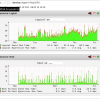Search Exchange
Search All Sites
Nagios Live Webinars
Let our experts show you how Nagios can help your organization.Login
Directory Tree
Check Hyperv Performance
Current Version
0.1
Last Release Date
2013-02-08
Compatible With
- Nagios 3.x
- Nagios XI
Owner
License
GPL
Hits
66577
Files:
| File | Description |
|---|---|
| check_hyperv_perf_plugin_0.1.zip | Plugin Package |
Meet The New Nagios Core Services Platform
Built on over 25 years of monitoring experience, the Nagios Core Services Platform provides insightful monitoring dashboards, time-saving monitoring wizards, and unmatched ease of use. Use it for free indefinitely.
Monitoring Made Magically Better
- Nagios Core on Overdrive
- Powerful Monitoring Dashboards
- Time-Saving Configuration Wizards
- Open Source Powered Monitoring On Steroids
- And So Much More!
* Guest CPU
* Guest Healthy Count
* Guest Network Usage
* Guest Storage Performance
* Host CPU
Plugin uses NSClient++
Reviews (3)
Help me !!!
i have hyper-v 2012 r2
I get this
CRITICAL - Socket timeout
i have hyper-v 2012 r2
I get this
CRITICAL - Socket timeout
byicecreamguy, March 10, 2014
I switched over from nagiosgraph to PNP4Nagios just to use this plugin, definitely worthwhile if you're monitoring a lot of VMs. It's a bit of a pain to have to add guests manually to each host, and there is no support for monitoring guests automatically during migration, however I don't know if there's a better way and appending a hostname to one line when a guest is added is much better than having to add multiple lines of config. Having the graphs auto-populate the way they do is a huge timesaver.
bytweaver, March 8, 2013
Nice easy to use plugin. I did make a couple of changes on the plugin on my environment:
Added an extra function to change Bytes into MBytes:
sub normalize {
my $megabits = $_[0] / 1048576;
return $megabits;
}
Then at the end of the script added the following to line 178:
if($option eq "gueststorage") {
#Convert Display to MB/s
my @originalSpeed = $columns[0] =~ m/= (d+.d+)/;
my $speed = sprintf("%.2f", normalize($originalSpeed[0]));
$columns[0] =~ s/$originalSpeed[0] b/s/$speed MB/s/;
#Convert Perf Data to MB/s
my @originalSpeed = $columns[1] =~ m/=(d+.d+)/;
my $speed = sprintf("%.2f", normalize($originalSpeed[0]));
$columns[1] =~ s/$originalSpeed[0]b/s/${speed}MB/s/;
}
It just puts the Bytes/s into MBytes/s when using "gueststorage" and rounds to 2 decimal places just for easier readability.
Added an extra function to change Bytes into MBytes:
sub normalize {
my $megabits = $_[0] / 1048576;
return $megabits;
}
Then at the end of the script added the following to line 178:
if($option eq "gueststorage") {
#Convert Display to MB/s
my @originalSpeed = $columns[0] =~ m/= (d+.d+)/;
my $speed = sprintf("%.2f", normalize($originalSpeed[0]));
$columns[0] =~ s/$originalSpeed[0] b/s/$speed MB/s/;
#Convert Perf Data to MB/s
my @originalSpeed = $columns[1] =~ m/=(d+.d+)/;
my $speed = sprintf("%.2f", normalize($originalSpeed[0]));
$columns[1] =~ s/$originalSpeed[0]b/s/${speed}MB/s/;
}
It just puts the Bytes/s into MBytes/s when using "gueststorage" and rounds to 2 decimal places just for easier readability.


 New Listings
New Listings
